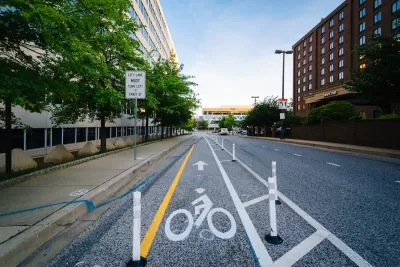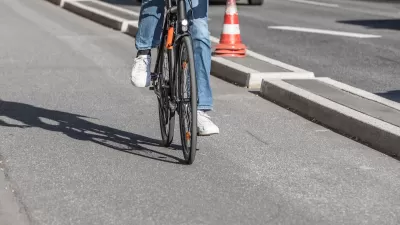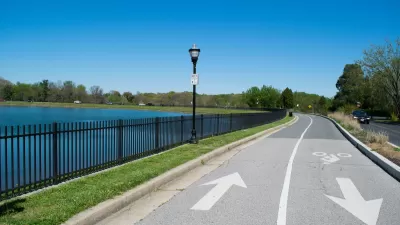Projects on roadways maintained by the state DOT will have to comply with Complete Streets requirements as part of a broader effort to reduce traffic deaths in the state.

The Maryland Department of Transportation (MDOT) issued a new, department-wide Complete Streets policy, signaling a renewed commitment to improving road safety for pedestrians and cyclists.
According to an announcement from MDOT, “the Complete Streets policy will ensure MDOT’s multi-billion-dollar capital program funds safe, complete streets for all Marylanders.”
Complete Streets requirements will apply to capital improvement projects, new or reconstructed streets connecting to MDOT rights-of-way, and “When there is an opportunity to improve safety for all users by applying proactive engineering safety countermeasures to resurfacing projects.”
The policy requires each MDOT mode or transportation type to develop strategies for implementation within the next six months “with the goal of increasing equitable access to the transportation network — from better transit connections to safer crossings.” It also focuses on driver education and traffic enforcement.
The statement notes, “The policy applies to new projects and is not retroactive for ones that have achieved 30% or more design and approval pursuant to the National Environmental Policy Act (NEPA) or that will achieve those milestones by December 1.”
FULL STORY: Maryland Transportation Secretary Wiedefeld Implements New Statewide Complete Streets Policy

Alabama: Trump Terminates Settlements for Black Communities Harmed By Raw Sewage
Trump deemed the landmark civil rights agreement “illegal DEI and environmental justice policy.”

Study: Maui’s Plan to Convert Vacation Rentals to Long-Term Housing Could Cause Nearly $1 Billion Economic Loss
The plan would reduce visitor accommodation by 25% resulting in 1,900 jobs lost.

Planetizen Federal Action Tracker
A weekly monitor of how Trump’s orders and actions are impacting planners and planning in America.

Waymo Gets Permission to Map SF’s Market Street
If allowed to operate on the traffic-restricted street, Waymo’s autonomous taxis would have a leg up over ride-hailing competitors — and counter the city’s efforts to grow bike and pedestrian on the thoroughfare.

Parklet Symposium Highlights the Success of Shared Spaces
Parklets got a boost during the Covid-19 pandemic, when the concept was translated to outdoor dining programs that offered restaurants a lifeline during the shutdown.

Federal Homelessness Agency Places Entire Staff on Leave
The U.S. Interagency Council on Homelessness is the only federal agency dedicated to preventing and ending homelessness.
Urban Design for Planners 1: Software Tools
This six-course series explores essential urban design concepts using open source software and equips planners with the tools they need to participate fully in the urban design process.
Planning for Universal Design
Learn the tools for implementing Universal Design in planning regulations.
Caltrans
Smith Gee Studio
Institute for Housing and Urban Development Studies (IHS)
City of Grandview
Harvard GSD Executive Education
Toledo-Lucas County Plan Commissions
Salt Lake City
NYU Wagner Graduate School of Public Service





























